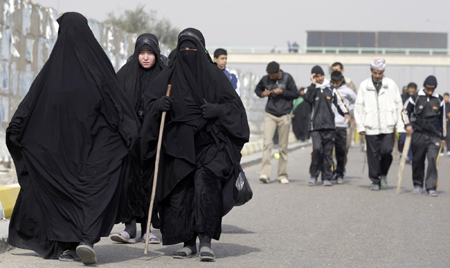Global General
Female suicide bomber in Iraq kills 54
(Agencies)
Updated: 2010-02-02 06:45
 |
Large Medium Small |
BAGHDAD: A female suicide bomber detonated her explosives inside a way station for Shiite pilgrims Monday, killing 54 people and rattling security officials who are struggling against a possible rise in violence before key elections next month.
The attack was the third major strike by suspected Sunni insurgents in a week and left Baghdad's top security official acknowledging that extremists are adopting new methods to outwit bomb-detection squads such as stashing explosives deep inside the engines and frames of vehicles.
US and Iraqi officials are deeply concerned that insurgents such as al-Qaida in Iraq could step up violence before March 7 parliamentary elections, which are seen as a critical step in reconciliation between the majority Shiites and the Sunnis who lost control with the toppling of Saddam Hussein.
The latest attack was another blow - but not entirely unexpected.
Shiite pilgrims are easy targets for bombers who can mingle with the crowds streaming on roads to shrines and other sites. The current pilgrimage is one of the largest.
Hundreds of thousands of people are walking this week toward Karbala in southern Iraq before the culmination of religious events Friday - marking the end of 40 days of mourning following the anniversary of the death Imam Hussein, a revered Shiite figure.
Iraqi security forces have promised to protect the pilgrims with expanded patrols and checkpoints. But Monday's bombing shows the huge challenges of trying to find a single attacker among the throng.
The bomber hid the explosives beneath an abaya - a woman's black cloak worn from head to toe - as she joined a group of pilgrims on the outskirts of Baghdad's Shiite-dominated neighborhood of Shaab, said Maj. Gen. Qassim al-Moussawi, Baghdad's top military spokesman.
The bomber set off the blast - described as a huge fireball - as she lined up with other women to be searched by female security guards at a checkpoint just inside a rest tent serving sherbet and tea.
People were "on the ground, covered in blood and crying for help. Banners were all over the ground and covered in blood," said witness Raheem Kadhom, 35.
The blast was so powerful it blew some people out of their slippers and shoes, which were scattered across the ground, he said. Many of the wounded were loaded into cars instead of waiting for ambulances.
A police official said 54 people, including 18 women and 12 children, were killed and 117 were wounded. A hospital official confirmed the casualties. Both officials spoke on condition of anonymity because they were not authorized to talk to the media.
|
 |
|
Shi'ite pilgrims march to the holy city of Kerbala to mark Arbain, in Baghdad's Saidiya district January 30, 2010. Arbain marks the end of a 40-day mourning period following Ashura, the religious ritual that commemorates the death of the Prophet Mohammad's grandson Imam Hussein in 680 A.D. [Photo/Agencies] |
Despite an overall decline in violence in Iraq, al-Qaida and other Sunni extremists have continued to strike Shiite civilians as they have since the insurgency took root in 2004. Pilgrims are a frequent target to try to stoke sectarian strife and weaken the Shiite-dominated government.
During a Shiite pilgrimage in February 2009, a female suicide bomber attacked a tent filled with women and children resting during the walk to Karbala, killing 40 people and wounding 60 others. A month before that, a suicide bomber dressed in women's clothing and hiding among Iranian pilgrims killed more than three dozen people outside a mosque in Baghdad's Shiite neighborhood of Kazimiyah.
The election campaign does not officially begin until next week, but there is already apprehension that insurgents could shift their attacks to campaign rallies and other events appealing for a large turnout. Iraqi state TV has started running spots to encourage voters with themes of patriotism and fighting violence.
Security forces were put on alert shortly after Monday's attack, al-Moussawi said.
"We informed all checkpoints to be careful and to intensify the search procedures," he said.
Iraqi authorities do not have enough policewomen to conduct searches of female travelers at most checkpoints, and security forces have been reluctant to use bomb-sniffing dogs because of cultural sensitivities.
Al-Moussawi warned that insurgent groups were using new tactics to smuggle explosives past security forces.
"Terrorist groups have come up with ways to hide explosive substances that cannot be detected with bomb detector sets," he said in a statement posted on his Web site.
Iraq's forces have been using a bomb-detection device at checkpoints across the country that Britain banned for export after questions were raised about whether it works. Iraqi security officials have defended the device, though they began their own investigation after the U.S. military also said the unit was ineffective.
Baghdad's military command, meanwhile, has referred 134 members of Iraq's security forces for investigation. They are suspected of negligence for the security lapses in the bombings last week, al-Moussawi said.
Iraq's monthlong election campaign officially begins next week, raising worries of more attacks to try to disrupt the process and embarrass the government of Prime Minister Nouri al-Maliki.
US Ambassador Christopher Hill told The Associated Press on Monday that the elections need to be widely accepted as fair otherwise protests by the losers may bog down the formation of a new government and open the door to wider unrest.
"We clearly need an election process whose outcome the Iraqi people accept," Hill said in an interview. "We don't want a situation where some people, or some groups of people, do not accept the outcome. Because then you have a substantial percentage of people who do not accept the outcome that can make the security situation problematic."
But Hill believes that a fierce controversy over a ballot purge of candidates who are suspected Saddam loyalists will likely be resolved before the vote. An estimated 450 candidates have been barred from the ballot for suspected links to Saddam's now outlawed Baath Party.
In northern Iraq, gunshots were fired at the motorcade of the Ninevah provincial governor, Atheel al-Nujaifi, about 25 miles (40 kilometers) north of Mosul, said a security official who spoke on condition of anonymity because he was not authorized to brief media.
The governor was not injured, but some of the vehicles in the convoy were damaged, the officials said.
The shots occurred while al-Nujaifi was visiting a dam and was met by Kurdish protesters waving flags and banners from their nearby northern enclave.
Al-Nujaifi is considered a strong opponent of Kurdish efforts expand their influence into the Mosul area.
Associated Press Writers Chelsea J. Carter, Lara Jakes, Bushra Juhi and Qassim Abdul-Zahra contributed to this report.











